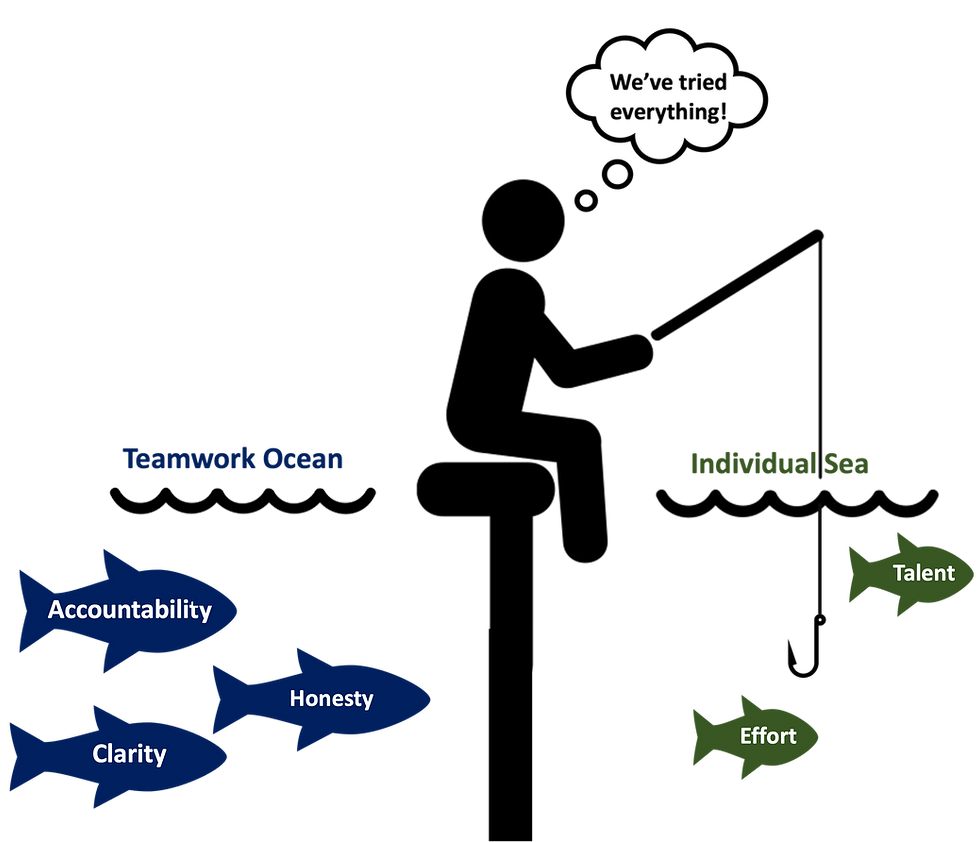Why Most Teams Don't Exist
- Sam Dailey

- Oct 25, 2023
- 4 min read
Updated: Oct 31, 2023

Interpersonal behavior is the only true measure of a team. At work, we forget this. The closest most working teams get to an intentional focus on behavior is defining their "core values". Once defined, these values sit, gathering dust, while team members go about the real work of delivering results in silos. Rarely do teams reflect on the values, asking whether they have the "right" ones or if they're living up to them.
Almost all teams' energy and resources are focused on results rather than the behaviors that drive those results. They fixate stubbornly on individual execution - talent and effort, talent and effort, talent and effort...
Genuine teamwork withers in this environment as selfish behavior creeps in. Silos form, frustration and resentment abound, and productivity flattens as the team's energy disperses in a multitude of different directions.
And then, when results go awry, in order to avoid shifting the spotlight to behavior (and thus implicating every member of the team, who is jointly responsible for behavioral norms), teams point the finger at external factors or at an individual team member. External factors are distractions, and replacing team members is effective only to the extent it resets the behavioral norms of the remaining team.
Imagine a CEO reporting to the board: "we failed to hit our numbers this year because we didn't speak honestly and align intentionally around the right goals"? More often than not, such a statement would be closer to the truth than the standard explanation of market headwinds or execution blunders.
What if you, as a member and therefore leader of a team, started moving closer to the truth? What if you addressed the group behavior underlying all of your team's performance results?
This shift in awareness would create more ownership, alignment, and commitment across the group. It would forge relationships that are defined by trust and accountability. It would decrease unwanted attrition, improve engagement, and improve productivity. It would change the way you work.
Why is it hard to address a leadership team's behavioral challenges?
Well, by the time most individuals "graduate" to executive team membership, they've received between three and five decades of positive reinforcement for individual accomplishment. Teamwork Shmeamwork.
Our society tells a collective story that the path to success is a path of personal excellence. We worship individual skills - grit, intelligence, creativity - and share heroic stories of individual achievement. We do not live in a culture that respects the virtues of collective behavior (and it shows). We find these topics - setting priorities, instilling accountability, expressing vulnerability - unsexy and de-prioritize them.
Said simply: we believe in individuals but we don't believe in teams.
And so, to the extent we are aware of behavioral issues, we assign them to the individual level ("Aaron is awful at giving feedback..."). We fail to see the systemic causes of individual issues.
Team behavior is a powerful lens for just that reason: it demands, as it's foundation, collective ownership.

Below are suggestions for different ways to improve the behavior of your team:
First, review your values. Have an honest, team-wide conversation reviewing your core values (assuming you have them...) Ask in what ways you convert this core value to behavior and in what ways you do not. For values that you're not living up to, you have two options: (1) intentional behavior change, or (2) drop the value. It's better to be honest that something is not a true value for your team than to pretend it is and act differently.
Second, run a team evaluation. Your core values are your differentiators, but if the conversation stops there, you're not addressing the full range of every-day behaviors that contribute to team success. Adopt a comprehensive behavioral framework by investing in a tool or process that addresses the full range of team behaviors. I personally recommend (and have a partnership with) Roster, which has decades of experience working with PE-funded start-ups. Reach out if you'd like to learn more about our services.
Lastly, start a conversation with "I". If you're not ready for either of the steps above, or not empowered to initiate them, there is a simple step that any team member can take: call yourself forward. First, identify a behavioral struggle that holds your team back. Second, specify your own role in contributing to the struggle. Third, share your observations in front of the team if you are comfortable, or in front of individual members if you are not. You will be starting an important dialogue, doing so with accountability, and this action will have ripples.
Below is a simple but comprehensive model of team behavior you can use as a template, if you want to do this work on your own. Work flows chronologically, from behavior 1 to behavior 5, and then back to the top. The behavior of delivering value to customers, normally the focus of all attention, happens naturally between 4 and 5.
(1) Trusting
Do we: express vulnerability, admit mistakes, share challenges, give appreciation
(2) Communicating
Do we: inquire, advocate, listen, challenge, disagree
(3) Aligning
Do we: goal-set, differentiate, strategize, prioritize, disseminate
(4) Committing
Do we: consent, clarify, commit, enroll, assign
(5) Growing
Do we: experiment, measure results, give/receive feedback, instill accountability


Comments